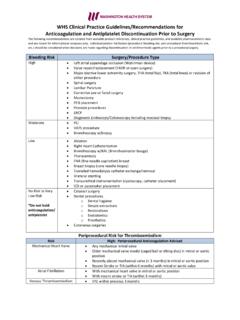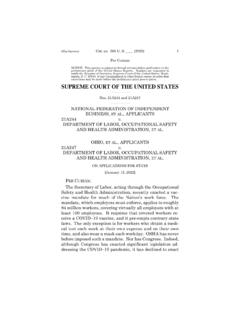Transcription of WHAT TO DO IF YOU’RE STOPPED BY POLICE, AGENTS OR …
1 WHAT TO DO IF YOU'RE STOPPED BY. police , IMMIGRATION AGENTS OR THE FBI. YOUR RIGHTS. You have the right to remain silent. If you wish to exercise that right, say so out loud. Remember anything you say can be used against you. You have the right to refuse to consent to a search of yourself, your belongings, your car or your home. If you are not under arrest, you have the right to calmly leave. You have the right to a lawyer if you are arrested. Though one will not be provided immediately, you can and should invoke your right to one by asking for one immediately. Regardless of your immigration or citizenship status, you have constitutional rights. YOUR RESPONSIBILITIES. Do stay calm and be polite. Do not interfere with or obstruct the police .
2 Do not lie or give false documents. Do prepare yourself and your family in case you are arrested. Do remember the details of the encounter. Do file a written complaint with the police department's internal affairs division and notify the ACLU if you believe your rights have been violated. IF YOU ARE STOPPED FOR QUESTIONING. Stay calm. Don't run. Don't argue, resist or obstruct the police , even if you are innocent or police are violating your rights. Do not touch any police officer and keep your hands where police can see them. Ask if you are free to leave. If the officer says yes, calmly and silently walk away. If you are under arrest, you have a right to know and to know why. You have the right to remain silent and cannot be punished for refusing to answer questions.
3 If you wish to remain silent, tell the officer out loud. Refusing to answer may make police suspicious of you. Identifying Yourself: Arkansas law requires you to identify yourself to a law enforcement officer upon request. police can't legally arrest you for refusing to provide your name unless you are suspected of criminal activity or your identification is needed to protect officer safety or resolve the reasonable suspicions that prompted the stop. If you reasonably fear that your name is incriminating, you can claim the right to remain silent. If you are asked your identity, you must use your discretion as to whether you wish to refuse or to ask the law enforcement purpose of the request. You do not have to consent to a search of yourself or your belongings, but police may pat down your clothing if they suspect a weapon.
4 You should not physically resist, but you have the right to refuse consent for any further search. If you do consent, it can affect you later in court. IF YOU ARE STOPPED IN YOUR CAR. Stop the car in a safe place as quickly as possible. Turn off the car, turn on the internal light, open the window part way and place your hands on the wheel. Upon request, show police your driver's license, registration and proof of insurance. If given a ticket, you should sign it;. otherwise you can be arrested. You can always fight the case in court later. If an officer or immigration agent asks to look inside your car, you can refuse to consent to the search. If police have probable cause to believe your car contains evidence of a crime, your car can be searched without your consent.
5 Both drivers and passengers have the right to remain silent. If you are a passenger, you can ask if you are free to leave. If the officer says yes, sit silently or calmly leave. Even if the officer says no, you have the right to remain silent. IF YOU ARE QUESTIONED ABOUT YOUR IMMIGRATION STATUS. You have the right to remain silent and do not have to discuss your immigration or citizenship status with police , immigration AGENTS or any other officials. You do not have to answer questions about where you were born, whether you are a citizen, or how you entered the country. (Separate rules apply at international borders and airports, and for individuals on certain nonimmigrant visas, including tourists and business travelers.)
6 If you are not a citizen and an immigration agent requests your immigration papers, you should show them if you have them with you. If you are over 18, carry your immigration documents at all times. If you do not have immigration papers, say you want to remain silent. Do not lie about your citizenship status or provide fake documents. IF THE police OR IMMIGRATION AGENTS COME TO YOUR HOME. If the police or immigration AGENTS come to your home, you do not have to let them in unless they have certain kinds of warrants. Ask the officer to slip the warrant under the door or hold it up to the window so you can inspect it. A search warrant allows police to enter the address listed on the warrant, but officers can only search the areas and for the items listed.
7 An arrest warrant allows police to enter the home of the person listed on the warrant if they believe the person is inside. A warrant of removal/deportation (ICE warrant) does not allow officers to enter a home without consent. Even if officers have a warrant, you have the right to remain silent. If you choose to speak to the officers, step outside and close the door. In some emergency situations (like someone inside screaming for help or If police are chasing someone who is fleeing) officers may enter a home without a warrant. IF YOU ARE CONTACTED BY THE FBI. If an FBI agent comes to your home or workplace, you do not have to answer any questions. Tell the agent you want to speak to a lawyer first. If you are asked to meet with FBI AGENTS for an interview, you have the right to say you do not want to be interviewed.
8 If you agree to an interview, have a lawyer present. You do not have to answer any questions you feel uncomfortable answering, and can say that you will only answer questions on a specific topic. IF YOU ARE ARRESTED. Do not resist arrest, even if you believe the arrest is unfair. Say you wish to remain silent and ask for a lawyer immediately. Don't give any explanations or excuses. If you can't pay for a lawyer, you can still invoke your right to one and you may have the right to free counsel. Don't say anything, sign anything or make any decisions without a lawyer. You have the right to make a local phone call. The police cannot listen if you call a lawyer, but they may listen to or record other calls. Prepare yourself and your family in case you are arrested.
9 Memorize the phone numbers of your family and your lawyer. Make emergency plans if you have children or take medication. Special considerations for non citizens: Ask your lawyer about the effect of a criminal conviction or plea on your immigration status. Don't discuss your immigration status with anyone but your lawyer. While you are in jail, an immigration agent may visit you. Do not answer questions or sign anything before talking to a lawyer. Read all papers fully. If you do not understand or cannot read the papers, tell the officer you need an interpreter. IF YOU ARE TAKEN INTO IMMIGRATION (OR ICE ) CUSTODY. You have the right to a lawyer, but the government does not have to provide one for you. If you do not have a lawyer, ask for a list of free or low cost legal services.
10 You have the right to contact your consulate or have an officer inform the consulate of your arrest. Tell the ICE agent you wish to remain silent. Do not discuss your immigration status with anyone but your lawyer. Do not sign anything, such as a voluntary departure or stipulated removal, without talking to a lawyer. If you sign, you may be giving up any rights you have to try to stay in the Remember your immigration number ( A number) and give it to your family. It will help family members locate you. Keep a copy of your immigration documents with someone you trust. IF YOU FEEL YOUR RIGHTS HAVE BEEN VIOLATED. Remember: police misconduct cannot be challenged on the street. Don't physically resist officers or threaten to file a complaint.







